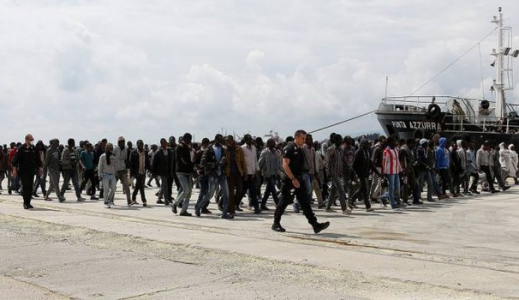Migrants turned away from Catania and Syracuse
On 30 September 2015 between 10-11am, a boat arrived in the port of
Catania. It had aboard 234 migrants, who had been put together from two
separate rescues: one boat with 124 people; one with 110 people. This
information was gathered from the few migrants who stayed in Catania. The
majority of the group were transported out of the city on four coaches. They
also said that waiting for them at the port on their arrival, in addition to
the police were, members of other organisations including: UNHCR, the Civil
Protection, Save the Children and OIM*. Some of those aboard were in
need of medical treatment and were hospitalised. In addition to the adults, some
children were also among those who arrived.
When they began to let them off the boat, the
migrants were asked standard identification questions and their photos were
taken. Then they were sat down and each given the standard kit: t-shirt,
slippers, soap, toilet paper. Then they were called one by one and put on
coaches which then left. All except for 32 migrants who were photographed again
and taken to the Palaspedini gym. The
people in the group, which was made up of men except for one woman, came from
Nigeria, Mali, the Ivory Coast, Gambia, Senegal and Morocco. Without having
been given anything to eat, they stayed in the gym all night with police guards
at the doors. In the morning five people arrived delivering documents to the
migrants stating that they could not claim asylum and highlighting the fact
that they must leave Italian territory within seven days. The migrants were
then told to leave; the police locked up the gym and left.
Activists from the Catania Anti-racist network
went to the Palaspedini gym in the
early afternoon to see what was going on, after having been aware that
something strange was happening the previous evening (30 September). And this
is how the thirty-one men, among whom was a minor who had been erroneously
registered as an adult, and a woman were found. They were sitting on the ground
in the rain, wearing t-shirts from the Red
Cross and green flip-flops. They were sitting there, not even knowing what
it was that they were waiting for. They had no real understanding of what had
happened and no idea as what to do next. They were unable to explain why some
of the original group had been allowed to stay in Italy and taken to various
centres, while they were being told they had to leave the country, despite the
fact that they had no money and so doing so was an impossibility. In the
meantime, six of the group, all of whom were Nigerian, had gone off with
another Nigerian, who had, no doubt, been in Italy for a while. He had offered
them a phone so that they could get in touch with their families and then
suggested that they follow him.
The rest of the group were accompanied to the Casa della Mercedes by volunteers from
the Anti-racist network and from Borderline
Sicilia, where they were offered something to eat and a bed for the night.
Meanwhile lawyers from the Anti-racist network, the Astalli Centre, Borderline Sicilia and A.S.G.I.* supplied advice and help to
follow the possible legal avenues. Many of the group spoke about leaving their
home countries due to problems associated to conflict in the region and violent
situations. Many of them spoke neither French nor English. We can only wonder
how it is then that they were provided with information on how to access
international protection.
As this was happening, we also learnt of a
similar situation, which occurred one week ago in the port of Augusta involving
a group of around 100 migrants. They came mainly from Gambia, Senegal, Mali,
Togo and Guinea Conakry. Thirty-five of them, six days after having arrived,
received an official document informing them they had to leave Italian soil
issued by the Syracuse Police Headquarters. On the Sunday they had to leave the
First Reception Centre situated between Noto and Palazzolo Acreide where they
had been staying and had to go to Syracuse. Once in the city, volunteers and legal
representatives from ARCI* managed to
find a place for them to stay in a parish church and provide some sort of legal
assistance after activating their network as quickly as possible. It appears
that the migrants, at least four of whom were minors despite being falsely registered
as adults, were not given the opportunity to clearly understand the situation
in which they found themselves when they arrived by boat, nor indeed the
possibility to ask for international protection. Like the other group of migrants,
they also found themselves caught by surprise by the documents which were
issued to them stating they had to leave the territory, which in this case were
delivered by the police after a few days with just a very brief translation and
no alternatives other than a life on the streets. The collective issuing of
such documents is an illegal practice, which has on several occasions been
sanctioned by the courts. The police headquarters continue to carry out such
practices, which are not only discretional but above all discriminatory,
maintaining the right to decide at the moment the migrants’ boat arrives who
can have access to apply for international protection and in turn access to the
reception system; and who, on the other hand should be considered an economic
migrant and therefore left on the street to fuel the illegal alternatives. The
concrete risk is that the activation of Europe’s most recent decision to open
‘hotspots’, will only serve to increase the adoption of such measures.
Giulia Freddi
Lucia Borghi
Borderline Sicilia
Translation: Claire Owen
*OIM – Organizzazione
internazionale delle migrazioni: International Organisation for Migration
*A.S.G.I.. – Associazione Studi
Giuridici sull’Immigrazione: Association for Judicial Studies on Immigration
*ARCI – Associazione Ricreativa e Culturale Italiana:
Italian Recreational and Creative Association


